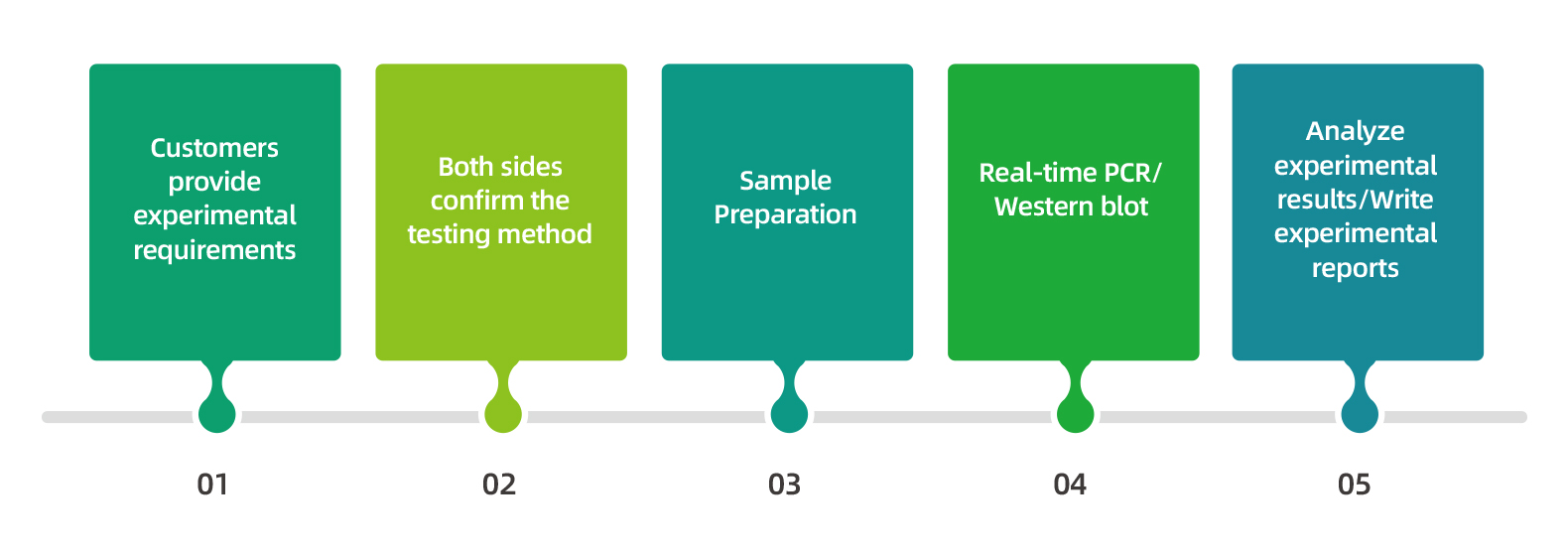Gene Overexpression Validation
Introduction
Introduction of foreign gene into cells or tissues is the very first step for studying gene expression and function. Plasmid and virus are the most common vehicles used for gene delivery in vitro and in vivo. Subclone the target gene into an expression vector, and then the recombinant construct is delivered into target cells to overexpress of its protein by cell transfection or virus transduction. The detection and monitoring of target gene overexpression is crucial for researchers’ projects, WZ Biosciences provides various molecular techniques for gene overexpression validation.
Service Details
WZ Biosciences offers gene overexpression validation at transcriptional level and translational level, as shown in the table below:
|
Cat No.
|
Type
|
Validation Method
|
Price
|
Turnaround Time
|
|
WZ080001
|
mRNA Level
|
qPCR
|
$400/test
|
1-2weeks
|
|
WZ080002
|
Protein Level
|
Western blot
|
$400/test
|
1-2weeks
|
*Interested in above overexpression validation services? Please feel free to contact us to “Request a quote” .
Related services: Molecular cloning, Adenovirus packaging, Lentivirus packaging, AAV packaging, Stable cell line generation
Real-time quantitative PCR & Western blot
Real-time quantitative PCR (also known as qPCR) is the most versatile, fastest and easiest method of gene quantitation. In qPCR, the entire PCR process is monitored in real time using monitoring the accumulation of fluorescent signals. The quantification of the DNA amount of unknown samples is accomplished by measuring its Ct and using a standard curve. Currently, SYBR Green and TaqMan qPCR are two frequently used methods. Among them, SYBR Green qPCR is the most economical and simplest method, which uses a fluorescent dye-SYBR Green that only fluoresces when bound to double stranded DNA (dsDNA) by intercalating between the DNA bases. This can measure the PCR products, thereby revealing gene expression at transcriptional level.
Western blot, also called Immunoblotting, is an important technique using specific antibodies to identify specific protein from complex mixture of proteins. The mixture of proteins is separated by PAGE (polyacrylamide gel electrophoresis) and then transferred to a membrane (PVDF or nitrocellulose) while maintaining the organization they had. The membrane is incubated with primary antibody specific to the protein of interest, and then secondary antibody is added to recognize the primary antibody. Secondary antibodies are typically enzymes or biotin.
After incubation target protein is visualized and detected through chemiluminescent detection or radioactive detection methods. Western blot is widely used for qualitative and semi-quantitative analysis of protein expression to reveal gene expression at translational level.
Service Process
Related Resorces

|
《Transfection Reagent Instructions》
|
|
|
|
|
What should I do if gene overexpression is unsuccessful?
|
Step 1
|
You need to confirm the correctness of your recombinant plasmid by aligning sequencing results.
|
|
Step 2
|
You need to confirm the successful transcription of your target gene by qPCR.
|
|
Step 3
|
You need to confirm the successful overexpression of your target protein by Western Blot.
|
|
By taking the above three steps, you can find the right problems and then solve them.
The outcomes of an overexpression experiment are typically affected by many factors, such as tags, plasmid quality, the effectiveness of antibodies, the half-life of the target protein, special types of proteins and the complexity of gene sequences. In addition, the choice of control group is also very critical in the experimental process. The control group can help researchers obtain perfect experimental results. Once the problems occur, it is also convenient for researchers to quickly find the right problems.
|







